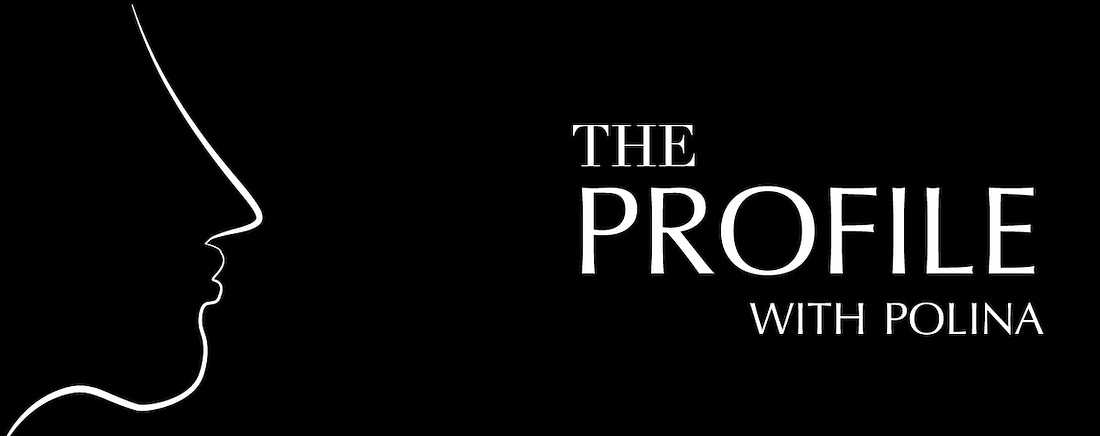The Profile: 10 Interview Techniques From the World’s Best Interviewers
The Profile: 10 Interview Techniques From the World’s Best InterviewersThis is the most comprehensive and practical guide on interviewing techniques from the world's very best conversationalists.I have a goal to become the best interviewer in the world. When I want to get better at something, I start by learning from the people who have mastered their craft. So I started with the following questions: Who are the world’s best interviewers, and what can they teach me? I spent the last month reviewing hours of interviews conducted by the best of the best to draw out highly specific techniques that make for an exceptional interview. I made this guide for myself, but I decided to make it public in case you want to implement these interviewing techniques in your own work. The tools outline below can be applied to journalistic interviews, job interviews, and hell, you can even use them on a first date. Before we begin, it’s worth nothing that all of these people are relentlessly curious, listen intently, do their research, and ask great questions. I won’t waste your time with those obvious, generic tips. What I’m interested in this piece is identifying the non-obvious, more nuanced techniques that lead to an exceptional (in-person) interview. Here’s what I found: 1. They know the first question sets the tone for the entire interviewThe first question matters because it’s the question that builds rapport between the interviewer and the interviewee. It’s also the question that sets the tone for the entire interview. Imagine you’re the interviewer: What is the first question you would ask Meta/Facebook founder and CEO Mark Zuckerberg? How about Osama bin Laden? Many people would go straight to the obvious — but that may not be the best approach. When Tim Ferriss interviewed Zuckerberg on his podcast, his opening question had nothing to do with privacy or data or social media addiction. It had to do with … fencing. Ferriss says, “In the course of doing research for this conversation, I chanced upon fencing … Now, fencing, I had seen in connection with your name, but I had no idea that you had been as competitive as you had been. Could you just describe your background with fencing and how you ended up competing?” It’s a question designed to get Zuckerberg to open up because it’s something that no one ever asks him about, and from his response, you can tell he’s delighted to tell the story of his competitive fencing days. Zuckerberg says, “This is probably one of the more interesting places to start an interview that I’ve ever done.” The question immediately wins Zuckerberg over and puts him on Ferriss’s side. From here on out, it’s easier to ask tougher questions because the opening set the tone that it would be more of a conversation than a grill session. For a grill session, you can watch Kara Swisher’s infamous interview with Zuckerberg during which he sweated through his hoodie. The first, second, and third questions of the interview were about privacy. Of course, there’s a time and a place for a bare knuckled-interview approach, but it’s one that risks burning a source. Zuckerberg didn’t speak to Kara Swisher for eight years following that interview. Larry King, the man who conducted 60,000 interviews during his multi-decade career, knows a thing or two about the art of building rapport. Fellow writer Adam Tank shared this clip with me, in which King talks about what he would ask al-Qaeda founder Osama bin Laden if he got the chance to interview him. 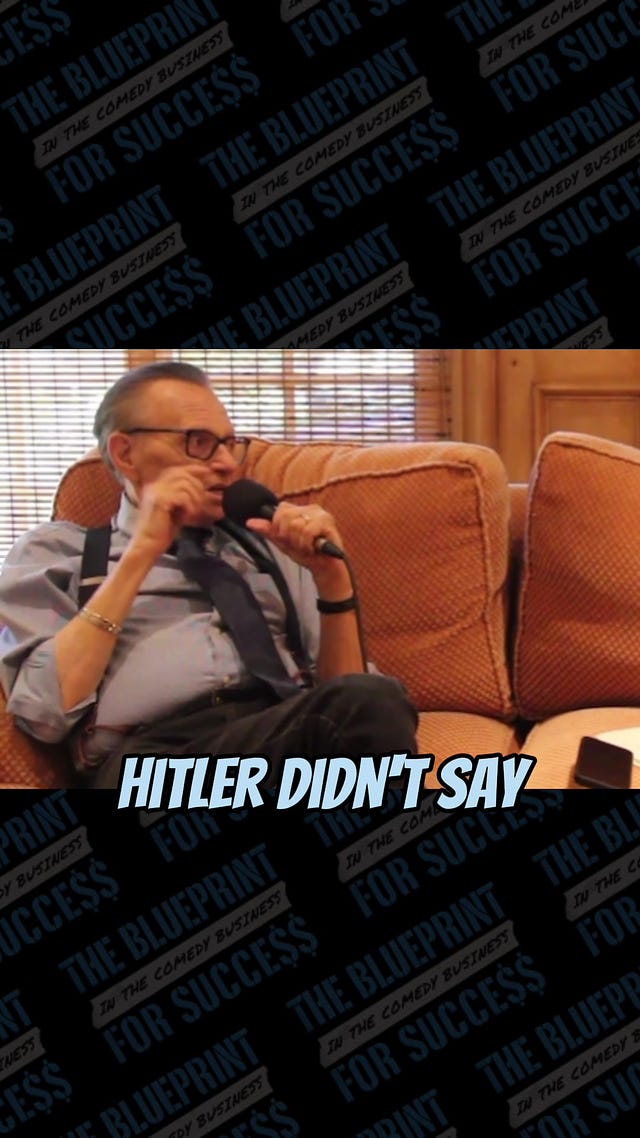 @barry_katzWhat Larry King would have asked Osama bin Laden. Comedians, actors, writers, directors, producers, managers, hosts, podcasters, agents, anyone in the business or who aspires to be! Join our FREE community through the link in my bio, where you will find a wealth of knowledge from some of the most successful and brilliant minds in the entertainment business who can help you take your career to the next level! #fypシ #evil #perception #larryking #askquestions #questions King says, “Nobody evil thinks they’re evil. Osama bin Laden didn’t comb his hair in the morning and say, ‘I’m a bad person.’ Hitler didn’t say, ‘I’m a bad person.’” So King often starts an interview to understand his guests’ perception of themselves — no matter how evil we may perceive them to be. So what would be the first question he asks Osama bin Laden? King says:
During the course of the interview, of course King would’ve asked about the events of Sept. 11, but that’s not where he would’ve started. He would’ve began by trying to understand how bin Laden sees himself, in hopes of gaining some insight into the mind of a person capable of committing such acts. Building rapport is an art, and the best interviewers know it starts with the very first question. Enjoying this? For more like this, make sure to sign up for The Profile here: 2. They explore the gap between expectation and realityThe most interesting bits of information are often found in the muddy middle … in the stories of the lives unlived. ‘Humans of New York’ photographer Brandon Stanton often asks this question when he meets a stranger: “How has your life turned out differently than you expected it to?” This question builds intimacy quickly because it explores the gap between how the person expected their life to turn out versus how it actually did. Another excellent interviewer who often employs this technique is Ira Glass, the creator of the hit radio show *This American Life.* To bypass small talk and head straight into the good stuff, Glass swears by these two questions: “How did you think the situation was going to work out before it happened? And then how did it really work out?” The reason these types of “gap” questions are so effective is because the answer contains two disjointed stories, and the person has to build a bridge to connect them. It also forces the interviewee to reflect on both scenarios by comparing them and describing why their imagined reality didn’t come to fruition but another one did. Exploring the “gap” can give you a window into how the subject feels about their life: Do they have regrets about the past or are they grateful for their present? Are they proud of the choices they made or do they wish they could have a do-over? There are many untold stories hiding in the gap between expectation and reality. 3. They ‘mirror’ to gather more intelIf you’re a regular listener of Joe Rogan’s podcast, you may notice that he often repeats the last part of a guest’s response and turns it into question. For example, author Abigail Shrier said, “Forty-two percent of [the rising generation] have had a mental health diagnosis,” and rather than asking her to explain in further detail, he simply turns her statement into a question, “Forty-two percent of kids have a mental health diagnosis?” This is enough to get her to explain the statistic in greater detail. This is a technique called “mirroring,” which I learned from FBI hostage negotiator Chris Voss. “Mirroring” is a rapport-building technique that is commonly used to put the other person at ease and gather intel. You “mirror” someone by repeating several key words they used in their last communication (i.e: “I had a really hard day because of all the stress I’m under.” Response: “The stress you’re under?”) Another technique some of the most exceptional interviewers use is called “labeling,” which is used to give voice to the other person’s feelings. A good label would be responding with one of the following: “It seems like…, It looks like ... , You seem to be…” (Ie: “It seems like you’re in a stressful situation.”) Using mirroring and labeling in the same conversation diffuses negative feelings, ensures the other person feels heard, and allows you to gather more information. 4. They master the art of interruptionThe best interviewers know when to interject. An easy way to do it is with a phrase like, “Can I interrupt you there for a moment,” or “let’s pause right here,” or “I want to highlight what you just said.” But for effect, it can sometimes serve you to be even more dramatic than that. During her bombshell interview with Prince Harry and Meghan Markle, Oprah Winfrey shows us that the interruption itself can become the defining moment of the interview. At one point, Markle drops a bomb by stating that someone in the Palace is concerned about how dark her baby’s skin might be when he is born. It’s clearly not something that Meghan planned to reveal as she suddenly becomes visibly uncomfortable. At that point, Winfrey dramatically throws her hands in the air and says, “Hold up, stop right now,” and repeats Markle’s last statement by saying, “There was a conversation with you about how dark your baby is going to be?” 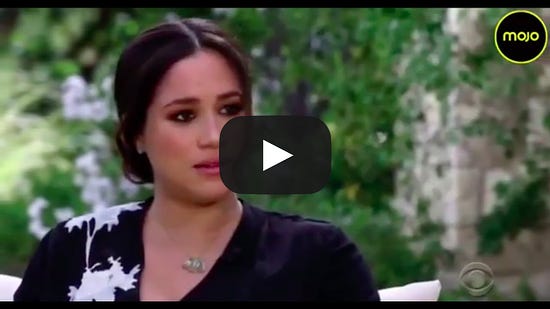 Without that dramatic interjection, Markle’s statement could’ve gone unexamined. However, Winfrey’s interjection forces Markle to clarify that she wasn’t actually part of this conversation, she didn’t hear it directly from the source, and she declines to reveal more as it may be “too damaging.” Winfrey was well aware that this would be a high-stakes interview watched by millions of people (17 million, to be exact). She knew that she had to give the pair the opportunity to clarify their claims, and a great way to do that is by interjecting during the most heated moments. Interruption is a cornerstone tactic of David Letterman’s interviewing style. You may notice that he leads his guest down a labyrinth of questioning that starts off verbose and nearly unintelligible and ends with a very direct question. It’s disarming but revealing. For instance, in his Netflix interview with Kim Kardashian, Letterman wanted to ask her where her political loyalties lie. (Kardashian has previously described herself as a Democrat who endorsed Hillary Clinton, but she then worked closely with the Donald Trump administration to assist with a clemency case.) In this interview, Letterman tried to get to the bottom with it via this exchange:
This is a technique Letterman uses a lot in his interviews, in which he begins with a convoluted series of questions that lead the guest directly to a pointed, direct question. Using interruption in this way can be effective in helping the interviewer avoid direct confrontation. It gently brings up the topic, injects confusion, and leads into a very direct question. 5. They make assumptions on purposeGreat interviewers serve as a representative of their audience. There’s another great moment in Oprah Winfrey’s interview with Prince Harry and Meghan Markle where she asks what we have all been wondering during the duration of the entire interview. Without being confrontational, Winfrey addresses the elephant in the room by asking Harry, “Please explain how you, Prince Harry, raised in a palace in a life of privilege — literally a prince — how you were trapped?” She addresses what the audience is thinking: Harry is a literal prince who enjoyed decades of privilege, wealth, money, and opportunities only to now be realizing that he was trapped in the royal lifestyle. Winfrey doubles down and asks a follow-up question when she doesn’t seem satisfied with his answer about how he has compassion for the rest of his “trapped” family. She says, “So the impression of the world, maybe it’s a false impression, is that all these years before Meghan, you were living your life as a royal, Prince Harry, the beloved Prince Harry, and that you were enjoying that life. We didn’t get the impression that you were feeling trapped in that life.” Howard Stern’s style seems so conversational in part because he is an expert user of the ‘making assumptions’ tactic. In an interview with actress Lindsay Lohan, Howard Stern makes a whole bunch of assumptions, and it forces her to react to each one. He says, “When you see like Emma Stone, who’s got a similar look to you, or let’s say, Jessica Chastain — I can tell you’ve thought about this — when you see some of those movies, don’t you sit there and go, ‘I can f**king do those movies?’ Right? It’s got to be driving you nuts.” Here’s another example of the technique in his interview with Gwyneth Paltrow, in which she tells Stern how her then-boyfriend Brad Pitt reacted when Harvey Weinstein made an inappropriate pass at her. Notice how his generic assumption of how things went down prompt Paltrow to tell the whole story in more vivid detail. 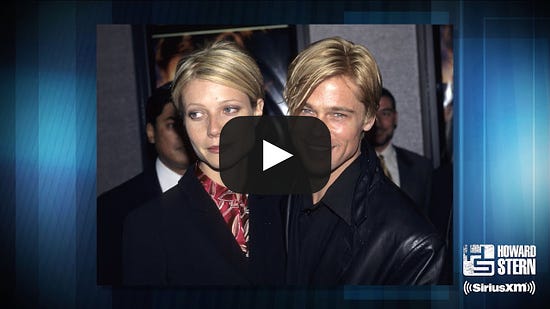 Both Winfrey and Stern make conjectures that their subjects must either accept or refute. This is a powerful technique because it’s not just a good tool to use in interviews, but also in everyday life. Calmly state an observation (ie: “It seems like …” or “It strikes me that…”) and allow the other person to respond. They will feel heard, appreciate that you gave them a chance to tell their side, and as a result, give you a more nuanced re-telling of the story. 6. They remove barriers to enhance intimacyOne way to build intimacy is to remove any and all furniture and objects that stand in the way between you and your guest. While other TV show hosts often interview across a table or behind a desk, Oprah Winfrey is known for walking the aisles of her studio to get as close as she can in proximity to her viewers. Oprah also often had her guests sit on the same couch as her or show her around their homes. Sean Evans is the host of Hot Ones, a podcast in which a guest is interviewed while eating progressively hotter chicken wings. Sean builds intimacy with phenomenal research and off-the-wall questions, but as someone on Reddit said: “Never underestimate the power of sharing a meal with someone. It's an activity that tends to inherently put people on equal footing.” The barrier that Sean is breaking down here is his guest’s composure. It’s often hard to conduct celebrity interviewers because they are media-trained and know how to maintain their composure under pressure. But that’s nearly impossible to do when the subject’s nose is running, eyes are tearing, and mouth is burning. See how actress Sydney Sweeney attempts to maintain her composure after a particularly spicy wing, but she can barely focus on the question:
7. They strive to capture the ‘juice’ of the storyIn 1999, the late journalist Barbara Walters interviewed Monica Lewinsky about her relationship with President Bill Clinton. It remains the highest-rated TV interview special, watched live at least in part by an estimated 74 million viewers. The reason that interview is so fascinating to watch is that you see Walters asking clarifying questions to make sure that she is representing Lewinsky’s point of view accurately. Here are two examples:
and
As you can see, these are not hard news-style questions, but they get into Lewinsky’s psyche and give us context around how she was feeling at the time to help explain why she made the decisions she did. That’s what Walters refers to as “the juice,” or the details of the story that humanize the person you’re interviewing. She says, “Don’t be so intent on getting just the facts that you take out all the juice.” 8. They challenge the subject’s perspective with genuine curiosityIn 1977, Barbara Walters interviewed the Shah of Iran, Mohammad Reza Pahlavi, and challenged his views that women are inferior to men. It’s been called “one of the most painful exchanges ever recorded between a journalist and a world leader.“ It’s a masterclass in preparation and courage. You can watch it here: 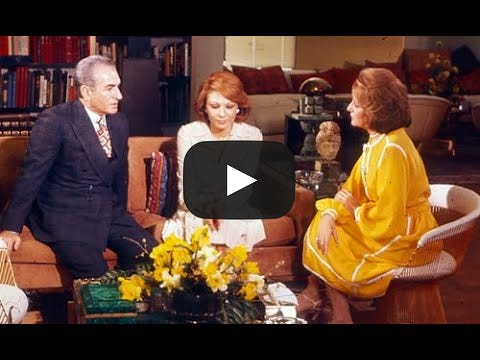 She is masterful at asking questions that further drive her point across while still being respectful. And when he says, “I prefer not to answer,” she doesn’t let him off the hook. Here’s why Walters’s exchange with Pahlavi is so powerful: She comes prepared, challenges his point of view, has an answer to his claim there are no female scientists, asks follow-up questions, and stays calm — all the while paying attention to his wife’s body language before directing a question at her. To challenge someone’s point of view in a credible way, the interviewer must be prepared, and it’s painfully obvious when they’re not. (Here’s an example of a reporter trying to challenge Elon Musk without proper preparation.) When reflecting on her interview with Pahlavi, Walters later notes that her technique is to ask probing questions with nuance and grace that won’t scare away her subject. Here’s how she described it in 2003:
With the two statements, Walters perfectly demonstrates that there’s curiosity in the former and judgement in the latter. 9. They know all human beings seek genuine validationIf there’s one thing Oprah Winfrey has learned from conducting more than 37,000 interviews, it’s this: We all have a basic need to feel validated and understood. As soon as the camera shuts off, her interview subject often turns to her and asks the same question: “Was that okay?” Winfrey says she’s heard that question from George W. Bush, Barack Obama, and Beyoncé. “I’ve heard it from heroes and from housewives,” she says. “I’ve heard it from victims and perpetrators of crimes. I even heard it from Beyonce and all of her Beyoncéness.” This, Winfrey believes, is the common denominator in our human experience: “Everybody wants to know, “Did you hear me and did what I say matter?” That genuine empathy and innate curiosity has allowed Winfrey to touch millions of people. Ultimately, that’s what all the best interviewers do: They see people for who they are and validate their existence by being fully present in the moment. “I can tell you, in your daily encounters, in your kitchen, in your conference rooms, in your work, in all of your relationships...that is what every person you encounter is looking to know. Did you see me? Do you hear me? And every argument is about that,” Winfrey says. So I’ll leave you with the best piece of interviewing advice from Oprah Winfrey: “Make sure that the speed and distance and anonymity of our world doesn’t cause [you] to lose [your] ability to stand in somebody else’s shoes and recognize all that we share as a people.” 10. The only way to become a masterful interviewer is to … interviewLarry King conducted more than 60,000 interviews in his career. Oprah did more than 37,000 after decades of her TV show. To date, Joe Rogan has hosted more than 2,100 guests on his podcast. The truth is that the techniques listed in this article may help sharpen the skill of interviewing, but there is no substitute for the real-life, gritty, awkward experience of getting out there and asking people questions. And here’s the best part: You don’t need a talk show to practice the art of interviewing. The best way to improve is to have conversations with strangers and make it a goal to uncover something interesting about their life. Take ‘Humans of New York’ Brandon Stanton as an example. Stanton wasn't always good at talking to strangers. In fact, he was horrible at it. But he's now done it so much that it's become a part of his identity. "The only way to get to that place where you can have that rapport with a stranger is not by studying interview techniques," he says. "It’s by sitting with thousands and thousands and thousands and thousands of strangers until nothing feels strange about it anymore." … For more like this, make sure to sign up for The Profile here:Invite your friends and earn rewardsIf you enjoy The Profile, share it with your friends and earn rewards when they subscribe. |
Older messages
The Profile: OpenAI's billionaire & the tech investor who wants to save San Francisco
Sunday, April 14, 2024
This edition of The Profile features Sam Altman, Garry Tan, the creator of "Bluey," and others. ͏ ͏ ͏ ͏ ͏ ͏ ͏ ͏ ͏ ͏ ͏ ͏ ͏ ͏ ͏ ͏ ͏ ͏ ͏ ͏ ͏ ͏ ͏ ͏ ͏ ͏ ͏ ͏ ͏ ͏ ͏ ͏ ͏ ͏ ͏ ͏ ͏ ͏ ͏ ͏ ͏ ͏ ͏ ͏ ͏ ͏ ͏ ͏
The Profile: Crypto’s new billionaire villain & the most feared dealmaker
Sunday, April 7, 2024
This edition of The Profile features Barry Silbert, Michael Rubin, Palmer Luckey, Emily Weiss, and more. ͏ ͏ ͏ ͏ ͏ ͏ ͏ ͏ ͏ ͏ ͏ ͏ ͏ ͏ ͏ ͏ ͏ ͏ ͏ ͏ ͏ ͏ ͏ ͏ ͏ ͏ ͏ ͏ ͏ ͏ ͏ ͏ ͏ ͏ ͏ ͏ ͏ ͏ ͏ ͏ ͏ ͏ ͏ ͏ ͏ ͏ ͏ ͏
The Profile Interview: Meet the Relationship Therapist Helping Heal Your ‘Origin Wound’
Wednesday, April 3, 2024
Vienna Pharaon goes deep on the power of conflict, repair, and connection. ͏ ͏ ͏ ͏ ͏ ͏ ͏ ͏ ͏ ͏ ͏ ͏ ͏ ͏ ͏ ͏ ͏ ͏ ͏ ͏ ͏ ͏ ͏ ͏ ͏ ͏ ͏ ͏ ͏ ͏ ͏ ͏ ͏ ͏ ͏ ͏ ͏ ͏ ͏ ͏ ͏ ͏ ͏ ͏ ͏ ͏ ͏ ͏ ͏ ͏ ͏ ͏ ͏ ͏ ͏ ͏ ͏ ͏ ͏ ͏ ͏ ͏ ͏
The Profile: The 80-year-old crypto pioneer & the tech billionaire riding the AI wave
Sunday, March 31, 2024
This edition of The Profile features Michael Dell, Anne Hathaway, Larry Culp, Jeff Zucker, and more. ͏ ͏ ͏ ͏ ͏ ͏ ͏ ͏ ͏ ͏ ͏ ͏ ͏ ͏ ͏ ͏ ͏ ͏ ͏ ͏ ͏ ͏ ͏ ͏ ͏ ͏ ͏ ͏ ͏ ͏ ͏ ͏ ͏ ͏ ͏ ͏ ͏ ͏ ͏ ͏ ͏ ͏ ͏ ͏ ͏ ͏ ͏ ͏ ͏ ͏
The Profile: The parenting guru offering practical solutions & the player re-defining basketball
Sunday, March 24, 2024
This edition of The Profile features Becky Kennedy, Caitlin Clark, ͏ ͏ ͏ ͏ ͏ ͏ ͏ ͏ ͏ ͏ ͏ ͏ ͏ ͏ ͏ ͏ ͏ ͏ ͏ ͏ ͏ ͏ ͏ ͏ ͏ ͏ ͏ ͏ ͏ ͏ ͏ ͏ ͏ ͏ ͏ ͏ ͏ ͏ ͏ ͏ ͏ ͏ ͏ ͏ ͏ ͏ ͏ ͏ ͏ ͏ ͏ ͏ ͏ ͏ ͏ ͏ ͏ ͏ ͏ ͏ ͏ ͏ ͏ ͏ ͏ ͏ ͏
You Might Also Like
Why AI-produced articles are difficult to master
Friday, February 28, 2025
Let's look at the process of creating blog posts using AI tools the right way, that would make it possible for your content to be valuable to users and rank better.
Amazon Reveals It Had 20.93 Billion Searches in December - CrewReview
Friday, February 28, 2025
You're an Amazon whiz... but maybe not an email whiz. Omnisend makes setting up email for your brand as easy as click, drag, and drop. Make email marketing easy. Hey Reader, Believe it or not,
How AI Search Handles Citations, Google’s Latest Lawsuit + 2 Weird Niche Sites
Friday, February 28, 2025
It's Friday and that means one thing... ͏ ͏ ͏ ͏ ͏ ͏ ͏ ͏ ͏ ͏ ͏ ͏ ͏ ͏ ͏ ͏ ͏ ͏ ͏ ͏ ͏ ͏ ͏ ͏ ͏ ͏ ͏ ͏ ͏ ͏ ͏ ͏ ͏ ͏ ͏ ͏ ͏ ͏ ͏ ͏ ͏ ͏ ͏ ͏ ͏ ͏ ͏ ͏ ͏ ͏ ͏ ͏ ͏ ͏ ͏ ͏ ͏ ͏ ͏ ͏ ͏ ͏ ͏ ͏ ͏ ͏ ͏ ͏ ͏ ͏ ͏ ͏ ͏ ͏ ͏ ͏ ͏ ͏ ͏
Social care strategy, ads scaling tips, background carousels, and more
Friday, February 28, 2025
Today's Guide to the Marketing Jungle from Social Media Examiner... presented by social-media-marketing-world-logo The weekend is almost here, Reader! Before you unplug, here's one last round
Bitcoin industry insiders aren’t worried about the price correction
Friday, February 28, 2025
Today's letter features a guest post from Phil Rosen, the co-founder of Opening Bell Daily, an independent financial media company. ͏ ͏ ͏ ͏ ͏ ͏ ͏ ͏ ͏ ͏ ͏ ͏ ͏ ͏ ͏ ͏ ͏ ͏ ͏ ͏ ͏ ͏ ͏ ͏ ͏ ͏ ͏ ͏ ͏ ͏ ͏ ͏ ͏
OpenAI’s underestimated us!
Friday, February 28, 2025
Altman admits they ran out of GPUs—what now?
Influence Weekly #378 - YouTube Star MrBeast Is Raising Money at a $5 Billion Valuation
Friday, February 28, 2025
GTA Developer Explores Partnerships With Metaverse Creators To Transform Popular Game Into UGC Creative Hub
Weekly Dose of Optimism #133
Friday, February 28, 2025
Pancreatic Cancer Vaccine, Restoring Hearing, Loyal, Atlas, Apple, Coinbase, Lunar Landers ͏ ͏ ͏ ͏ ͏ ͏ ͏ ͏ ͏ ͏ ͏ ͏ ͏ ͏ ͏ ͏ ͏ ͏ ͏ ͏ ͏ ͏ ͏ ͏ ͏ ͏ ͏ ͏ ͏ ͏ ͏ ͏ ͏ ͏ ͏ ͏ ͏ ͏ ͏ ͏ ͏ ͏ ͏ ͏ ͏ ͏ ͏ ͏ ͏ ͏ ͏ ͏ ͏ ͏ ͏
VC valuations feel the pressure
Friday, February 28, 2025
AI prompts record VC funding; Kindred Ventures' Steve Jang on AI wearables; Stripe hits $91.5B valuation Read online | Don't want to receive these emails? Manage your subscription. Log in The
Standing on the other side of goodbye
Friday, February 28, 2025
Little moments that make me question: have I moved away or come home? ͏ ͏ ͏ ͏ ͏ ͏ ͏ ͏ ͏ ͏ ͏ ͏ ͏ ͏ ͏ ͏ ͏ ͏ ͏ ͏ ͏ ͏ ͏ ͏ ͏ ͏ ͏ ͏ ͏ ͏ ͏ ͏ ͏ ͏ ͏ ͏ ͏ ͏ ͏ ͏ ͏ ͏ ͏ ͏ ͏ ͏ ͏ ͏ ͏ ͏ ͏ ͏ ͏ ͏ ͏ ͏ ͏ ͏ ͏ ͏ ͏ ͏ ͏ ͏ ͏ ͏
